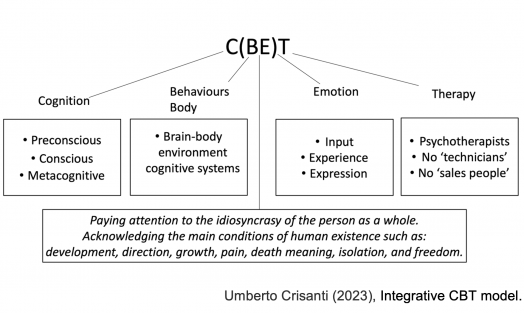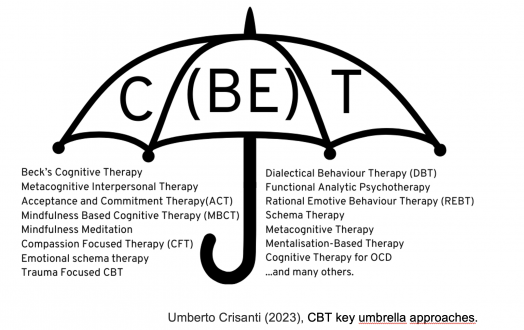Cognitive Behavioural Therapy, what is CBT?
CBT is an effective therapeutic approach for supporting individuals with mental health issues worldwide.
In honour of the BABCP 50th Anniversary, I delved into the existing literature and proposed a conceptualisation of CBT that captures its core principles, with the aim of helping clinicians and clients better understand and apply this valuable therapy.
To put it in simpler terms, I've developed a way to integrate different CBT
methods together to make personalised treatment plans for individuals.
CBT is like an umbrella term that covers a wide range of techniques, such as cognitive restructuring, exposure therapy, and behavioural activation and approaches.
What can you expect from our CBT sessions?
Awareness is the front door to change, and by being aware of your
reactions, you can begin to change both your thoughts and behaviours. In
our sessions, I will help you to:
- Develop a clear understanding of the presenting psychological problem at the beginning of the CBT process.
- Identify clear goals for therapy and a plan to tackle the problem.
- Understand the background/early life events that originally contributed to the development of the problem.
- Understand how your thinking and behaviours were maintaining the problem.
- Aim for regulation, not repression, of your emotions.
- Learn helpful CBT and mindfulness strategies and techniques to tackle the factors that maintained the problem.
- Plan relevant and helpful self-help activities to practice between sessions.
- Plan an agreed CBT treatment plan in a collaborative and supportive way.
- Understand the role of your subconscious in the maintenance of the problem.
- Integrate EMDR if you are stuck with difficult emotions or core beliefs.
Can CBT be long term and offer support?
Yes, CBT can be a long-term therapy that offers support and exploration.
While CBT is often considered a brief therapy, typically consisting of 12-20 weekly sessions, some individuals may benefit from longer-term CBT.
Long-term CBT may involve ongoing support and exploration of deeper issues that contribute to ongoing mental health problems. The length of therapy is usually determined by the individual's needs and progress, and it is often decided collaboratively between the therapist and the client.
Client testimonials
Get in touch
Feel free to contact me if you have any questions about how therapy works, or to arrange an initial assessment appointment. This enables us to discuss the reasons you are thinking of coming to therapy, whether it could be helpful for you and whether I am the right therapist to help.
All enquires are usually answered within 24 hours, and all contact is strictly confidential and uses secure phone and email services.
© Umberto Crisanti — powered by WebHealer


